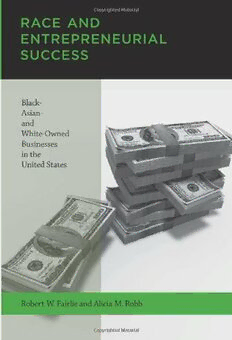
Race and Entrepreneurial Success: Black-, Asian-, and White-Owned Businesses in the United States PDF
253 Pages·2008·1.141 MB·English
Most books are stored in the elastic cloud where traffic is expensive. For this reason, we have a limit on daily download.
Preview Race and Entrepreneurial Success: Black-, Asian-, and White-Owned Businesses in the United States
Description:
Choice Outstanding Academic Title, 2009. Thirteen million people in the United States—roughly one in ten workers—own a business. And yet rates of business ownership among African Americans are much lower and have been so during the last 100 years. In addition, and perhaps more importantly, businesses owned by African Americans tend to have lower sales, fewer employees and smaller payrolls, lower profits, and higher closure rates. In contrast, Asian American-owned businesses tend to be more successful. In Race and Entrepreneurial Success, minority entrepreneurship authorities Robert Fairlie and Alicia Robb examine racial disparities in business performance. Drawing on the rarely used, restricted-access Characteristics of Business Owners (CBO) data set compiled by the U.S. Census Bureau, Fairlie and Robb examine in particular why Asian-owned firms perform well in comparison to white-owned businesses and black-owned firms typically do not. They also explore the broader question of why some entrepreneurs are successful and others are not. After providing new comprehensive estimates of recent trends in minority business ownership and performance, the authors examine the importance of human capital, financial capital, and family business background in successful business ownership. They find that a high level of startup capital is the most important factor contributing to the success of Asian-owned businesses, and that the lack of startup money for black businesses (attributable to the fact that nearly half of all black families have less than $6,000 in total wealth) contributes to their relative lack of success. In addition, higher education levels among Asian business owners explain much of their success relative to both white- and black-owned businesses. Finally, Fairlie and Robb find that black entrepreneurs have fewer opportunities than white entrepreneurs to acquire valuable prebusiness work experience through working in family businesses.
See more
The list of books you might like
Most books are stored in the elastic cloud where traffic is expensive. For this reason, we have a limit on daily download.
